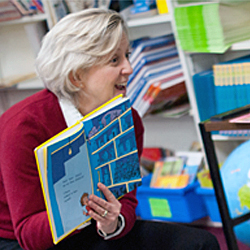“There is a great deal of noise on the stairs but nobody comes into the room.”
– John F. Kennedy
President Kennedy was referencing a Chinese proverb when he said that, making the point that it was easy to talk about problems, but much more difficult to fix them.
Kyle Zimmer, First Book’s president and CEO, is in China herself this week, addressing the World Economic Forum’s ‘Annual Meeting of the New Champions’ in Tianjin, the foremost gathering of business and nonprofit leaders in Asia. She’s there to talk about subjects near and dear to our hearts – social entrepreneurship and social impact investing.
 Social entrepreneurship is a new way of doing business, a hybrid of traditional nonprofits and for-profit companies that uses market forces to create social change. (Click here to read a recent blog post by Kyle where she explains what social entrepreneurship is and how it can change the world.)
Social entrepreneurship is a new way of doing business, a hybrid of traditional nonprofits and for-profit companies that uses market forces to create social change. (Click here to read a recent blog post by Kyle where she explains what social entrepreneurship is and how it can change the world.)
Social impact investing is a related concept; the idea of channeling investment toward mission-driven businesses and entrepreneurial nonprofits that are working to solve social problems.
As Kyle says in a piece published today in the Huffington Post and on the World Economic Forum’s blog:
Fundamentally there are holes on both the investor side and the social entrepreneur’s side of the aisle.
On the investor side, there is far more talk than there is traction. Certainly, a few funds have been established that focus on social investment, but it is difficult to see these as more than traditional charity, dressed up as investment.
Creative new designs in the financial category to address this need have been discussed for years, but few have made it to market. This lack of significant innovation by the investment community has been a major roadblock to the expansion of the social sector. Enterprises reach a certain level of growth and then choke from the lack of capital.
 Like any new idea, there’s a lot of work to be done. But Kyle is hopeful about the future, saying: “There we were all in a room at the World Economic Forum Annual Meeting of the New Champions – financial institutions and representatives of the social sector — talking about the challenges, which is a great step toward a cure.”
Like any new idea, there’s a lot of work to be done. But Kyle is hopeful about the future, saying: “There we were all in a room at the World Economic Forum Annual Meeting of the New Champions – financial institutions and representatives of the social sector — talking about the challenges, which is a great step toward a cure.”
At First Book, we’re working towards a new kind of solution to an old and intractable problem – how to ensure that the 30 million kids in the United States living in low-income families get the books and resources they need to succeed. Click here to learn some ways you can get involved.

A social entrepreneur is someone who sees a social problem — like hunger, homelessness or lack of access to clean water — and looks for ways to solve it. Unlike more traditional business entrepreneurs, who are trying to generate profits, social entrepreneurs are trying change society. Long-term change is important, not just solutions to the immediate problems.
At First Book, the problem we’ve been working on for twenty years is the unbelievable lack of books and other educational materials faced by children from low-income families. Books are painfully scarce for many of these kids; one study that never fails to shock showed that there is only one book available for every 300 children in some of the lowest-income neighborhoods in the country.
 First Book works by giving the teachers, librarians and local program leaders that work with these kids ongoing access to the new, quality books they need to do their jobs. Giving a child a new book of their own is a powerful thing, but the real impact comes from making sure they have books throughout their lives, from before they enter kindergarten until they graduate — with honors — from high school.
First Book works by giving the teachers, librarians and local program leaders that work with these kids ongoing access to the new, quality books they need to do their jobs. Giving a child a new book of their own is a powerful thing, but the real impact comes from making sure they have books throughout their lives, from before they enter kindergarten until they graduate — with honors — from high school.
So we were pleased to see ourselves listed as one of the five examples of nonprofits around the world providing “innovative yet pragmatic approaches to solving social problems” in a new report from the respected financial services company Credit Suisse.
The report, “Investing for Impact: How social entrepreneurship is redefining the meaning of return”, was just released at the World Economic Forum in Davos. You can learn more about it, and download a copy for yourself, online here.
In it, the Credit Suisse analysts have this to say:
[T]he potential of growing efforts to deliver entrepreneurial solutions to global problems is bigger than ever before – as are the opportunities to channel private capital toward social and environmental issues.
The report also quotes Mark Kramer, the co-founder and managing director of social impact consulting firm FSG:
 Many investors and philanthropists are turning to impact investments as equally valid and in some cases even more effective vehicles for social change than pure charity. To complement this growing interest, a number of new innovations are emerging in the field, ranging from new financial tools to better metrics for social impact to new impact investing funds.
Many investors and philanthropists are turning to impact investments as equally valid and in some cases even more effective vehicles for social change than pure charity. To complement this growing interest, a number of new innovations are emerging in the field, ranging from new financial tools to better metrics for social impact to new impact investing funds.
All that may sound a little dry, but it’s actually really exciting stuff. First Book, and groups like it around the world, are charting the way to better and more equitable societies.
But doing so requires support and funding on a large scale, so it’s a big deal that the international investment community is paying close attention to the work that we’re doing and the impact that we’re having.
Learn more about First Book and our work at firstbook.org, or sign up for monthly updates about ways you can get involved.

 Social entrepreneurship is a new way of doing business, a hybrid of traditional nonprofits and for-profit companies that uses market forces to create social change. (Click here to read a recent blog post by Kyle where she explains what social entrepreneurship is and how it can change the world.)
Social entrepreneurship is a new way of doing business, a hybrid of traditional nonprofits and for-profit companies that uses market forces to create social change. (Click here to read a recent blog post by Kyle where she explains what social entrepreneurship is and how it can change the world.) Like any new idea, there’s a lot of work to be done. But Kyle is hopeful about the future, saying: “There we were all in a room at the World Economic Forum Annual Meeting of the New Champions – financial institutions and representatives of the social sector — talking about the challenges, which is a great step toward a cure.”
Like any new idea, there’s a lot of work to be done. But Kyle is hopeful about the future, saying: “There we were all in a room at the World Economic Forum Annual Meeting of the New Champions – financial institutions and representatives of the social sector — talking about the challenges, which is a great step toward a cure.”


 First Book works by giving the teachers, librarians and local program leaders that work with these kids ongoing access to the new, quality books they need to do their jobs. Giving a child a new book of their own is a powerful thing, but the real impact comes from making sure they have books throughout their lives, from before they enter kindergarten until they graduate — with honors — from high school.
First Book works by giving the teachers, librarians and local program leaders that work with these kids ongoing access to the new, quality books they need to do their jobs. Giving a child a new book of their own is a powerful thing, but the real impact comes from making sure they have books throughout their lives, from before they enter kindergarten until they graduate — with honors — from high school. Many investors and philanthropists are turning to impact investments as equally valid and in some cases even more effective vehicles for social change than pure charity. To complement this growing interest, a number of new innovations are emerging in the field, ranging from new financial tools to better metrics for social impact to new impact investing funds.
Many investors and philanthropists are turning to impact investments as equally valid and in some cases even more effective vehicles for social change than pure charity. To complement this growing interest, a number of new innovations are emerging in the field, ranging from new financial tools to better metrics for social impact to new impact investing funds.